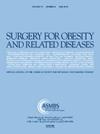Influence of referral type and sociodemographic factors on completion of bariatric surgery
IF 3.5
3区 医学
Q1 SURGERY
引用次数: 0
Abstract
Background
The impact of referral type and socioeconomic status on completion of the bariatric surgery process is not well understood.
Objectives
This study aims to 1) describe how sociodemographic characteristics influence referral type and 2) identify predictors of completion of surgery.
Setting
Large multihospital health care system, including a large academic medical center.
Methods
A retrospective study was performed using data from 2017 to 2022. Patients with a primary care physician within the hospital system who met criteria for bariatric surgery were included. The primary outcome was completion of bariatric surgery; the predictor was referral type (i.e., physician referral versus patient self-referral). Bivariate analysis and multivariable logistic regression were performed.
Results
Of 133,882 overall patients who met criteria for bariatric surgery, 41,387 had physician referrals for bariatric surgery or obesity medicine, 4702 self-referred, and 2740 underwent surgery. Patients who were Black, Hispanic, Medicaid insured, or in the most socially vulnerable zip codes were more likely to be self-referred (all P < .01). In a multivariable logistic regression, self-referred patients were more likely to undergo surgery (2.22 [1.82, 2.73]). Hispanic patients, while less likely to be referred overall, were more likely to undergo surgery if they were referred (1.29 [1.13, 1.47]). Patients with Medicare, Medicaid, and who were more socially vulnerable had lower odds of undergoing surgery.
Conclusions
Underserved groups are less likely to be referred by physicians for bariatric surgery. However, those patients who do self-refer are more likely to proceed to surgery, demonstrating the barrier is one of access not motivation.
转诊类型和社会人口因素对减肥手术完成的影响。
背景:转诊类型和社会经济地位对减肥手术过程完成的影响尚不清楚。目的:本研究旨在1)描述社会人口学特征如何影响转诊类型,2)确定手术完成的预测因素。环境:大型多医院医疗保健系统,包括大型学术医疗中心。方法:采用2017 - 2022年的数据进行回顾性研究。在医院系统内有符合减肥手术标准的初级保健医生的患者被包括在内。主要结局是完成减肥手术;预测因子是转诊类型(即,医生转诊与患者自我转诊)。进行了双变量分析和多变量logistic回归。结果:在133,882名符合减肥手术标准的患者中,41,387名患者接受了医生推荐的减肥手术或肥胖药物治疗,4702名患者自我推荐,2740名患者接受了手术。黑人、西班牙裔、医疗补助参保或居住在社会最脆弱的邮政编码地区的患者更有可能自我推荐(均P < 0.01)。在多变量logistic回归中,自我推荐的患者更有可能接受手术(2.22[1.82,2.73])。西班牙裔患者虽然总体上不太可能被转诊,但如果他们被转诊,则更有可能接受手术(1.29[1.13,1.47])。拥有医疗保险、医疗补助以及社会弱势群体的患者接受手术的几率较低。结论:服务不足的人群不太可能被医生推荐进行减肥手术。然而,那些自我推荐的患者更有可能进行手术,这表明障碍是途径而不是动机。
本文章由计算机程序翻译,如有差异,请以英文原文为准。
求助全文
约1分钟内获得全文
求助全文
来源期刊
CiteScore
6.70
自引率
12.90%
发文量
570
审稿时长
56 days
期刊介绍:
Surgery for Obesity and Related Diseases (SOARD), The Official Journal of the American Society for Metabolic and Bariatric Surgery (ASMBS) and the Brazilian Society for Bariatric Surgery, is an international journal devoted to the publication of peer-reviewed manuscripts of the highest quality with objective data regarding techniques for the treatment of severe obesity. Articles document the effects of surgically induced weight loss on obesity physiological, psychiatric and social co-morbidities.

 求助内容:
求助内容: 应助结果提醒方式:
应助结果提醒方式:


